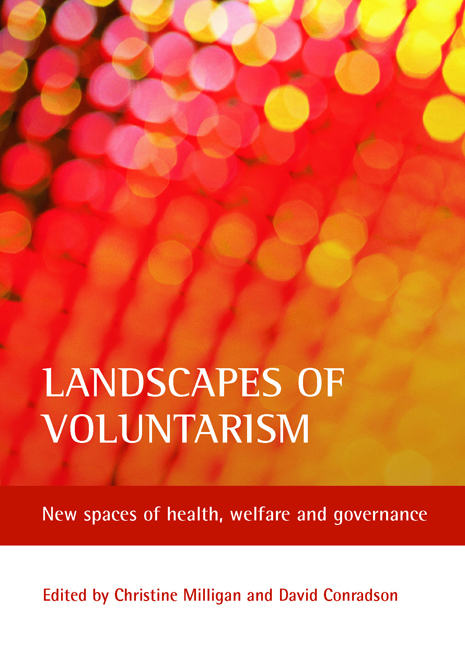Book contents
- Frontmatter
- Contents
- List of tables, figures, maps and plates
- Notes on contributors
- Foreword: Beyond the shadow state?
- one Contemporary landscapes of welfare: the ‘voluntary turn’?
- two A ‘new institutional fix’? The ‘community turn’ and the changing role of the voluntary sector
- three Renewal or relocation? Social welfare, voluntarism and the city
- four Voluntarism and new forms of governance in rural communities
- five New times, new relationships: mental health, primary care and public health in New Zealand
- six Informal and voluntary care in Canada: caught in the Act?
- seven Competition, adaptation and resistance: (re)forming health organisations in New Zealand’s third sector
- eight The difference of voluntarism: the place of voluntary sector care homes for older Jewish people in the United Kingdom
- nine Values, practices and strategic divestment: Christian social service organisations in New Zealand
- ten Faith-based organisations and welfare provision in Northern Ireland and North America: whose agenda?
- eleven Government restructuring and settlement agencies in Vancouver: bringing advocacy back in
- twelve Developing voluntary community spaces and Ethnicity in Sydney, Australia
- thirteen The voluntary spaces of charity shops: workplaces or domestic spaces?
- fourteen The changing landscape of voluntary sector counselling in Scotland
- fifteen Volunteering, geography and welfare: a multilevel investigation of geographical variations in voluntary action
- sixteen Reflections on landscapes of voluntarism
- Index
Foreword: Beyond the shadow state?
Published online by Cambridge University Press: 15 January 2022
- Frontmatter
- Contents
- List of tables, figures, maps and plates
- Notes on contributors
- Foreword: Beyond the shadow state?
- one Contemporary landscapes of welfare: the ‘voluntary turn’?
- two A ‘new institutional fix’? The ‘community turn’ and the changing role of the voluntary sector
- three Renewal or relocation? Social welfare, voluntarism and the city
- four Voluntarism and new forms of governance in rural communities
- five New times, new relationships: mental health, primary care and public health in New Zealand
- six Informal and voluntary care in Canada: caught in the Act?
- seven Competition, adaptation and resistance: (re)forming health organisations in New Zealand’s third sector
- eight The difference of voluntarism: the place of voluntary sector care homes for older Jewish people in the United Kingdom
- nine Values, practices and strategic divestment: Christian social service organisations in New Zealand
- ten Faith-based organisations and welfare provision in Northern Ireland and North America: whose agenda?
- eleven Government restructuring and settlement agencies in Vancouver: bringing advocacy back in
- twelve Developing voluntary community spaces and Ethnicity in Sydney, Australia
- thirteen The voluntary spaces of charity shops: workplaces or domestic spaces?
- fourteen The changing landscape of voluntary sector counselling in Scotland
- fifteen Volunteering, geography and welfare: a multilevel investigation of geographical variations in voluntary action
- sixteen Reflections on landscapes of voluntarism
- Index
Summary
Over the past two decades, the role of the non-profit, voluntary sector in the world of Western capitalist countries has been thrown into high relief. The sector has grown remarkably, expanding its activities and geographic reach. Moreover, as nation-state autonomy has eroded under the onslaught of globalisation, neoliberal policies towards welfare provision have gained momentum. Pressures to restructure the welfare state and to incorporate civil society organisations, such as foundations and non-profit institutions, into the state apparatus, have intensified. Under the guise of ‘third way’ approaches to domestic social policy that have taken firm root in many countries, voluntary sector organisations are now central actors in welfare state governance. They are also critical vehicles for service delivery and for citizenship action.
Traditional social science research on non-profit organisations has grown in volume and sophistication. This scholarship has emphasised the internal organisation behaviour of non-profits, relations between boards, staff and volunteers, and the challenges that the sector faces given a changing mix of funding opportunities. Non-profit research has also become far more international in scope, with a growing number of non-profit sector studies being conducted in Eastern Europe as well as the developing world.
But geographers have been leaders in the vanguard of critical scholarship on state–voluntary relations and their dynamics, and in particular have emphasised the role of the geographic context of voluntary action. Geographic research has highlighted the interdependence of the voluntary sector and government at various spatial scales, the uneven spatial patterns of non-profit sector resources, place-specificities of voluntary sector activities and activism, links between voluntarism and personal subjectivity, and the increasingly contradictory role that non-profit organisations play in politics and governance.
Nonetheless, the project of articulating a geography of voluntarism has only just begun. For that reason, this book represents an important and most welcome contribution. Landscapes of voluntarism showcases the richness of recent geographic work in the United Kingdom, Canada, Australia, New Zealand and the United States. It brings together some of the discipline's most insightful scholars to consider the changing dynamics of the welfare state and its implications for non-profit groups. Chapters focus on crucial subsectors such as health, mental health, social welfare and immigration assistance.
- Type
- Chapter
- Information
- Landscapes of VoluntarismNew Spaces of Health, Welfare and Governance, pp. xii - xviPublisher: Bristol University PressPrint publication year: 2006
- 3
- Cited by



